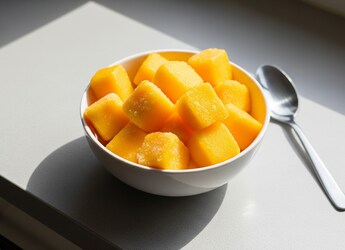ARTICLE AD BOX

Multivitamins aren’t just something your mom forced on you in school or that your doctor vaguely mentioned during your last check-up. For women—especially in a world of hustle culture, erratic meal schedules, and TikTok health trends—it’s not just about popping pills.
It’s about knowing why your body might be running low, and what to do about it.Sure, the idea of "eating a balanced diet" is sound advice. But in practice? Between skipping breakfast, surviving on caffeine, ordering late-night takeout, and battling hormonal rollercoasters—most of us are falling short on some seriously key nutrients.Here’s a closer look at the 10 vitamins and minerals that women need to keep their bodies running.
Spoiler: It's more than just iron and calcium.
Iron – Because exhaustion shouldn’t be your default mode
Iron is the energy plug-in we often forget to charge. And yet, it’s crucial for producing hemoglobin—the protein in red blood cells that carries oxygen. Women, especially those of reproductive age, lose iron every month. Add in heavy periods or a vegetarian/vegan lifestyle, iron deficiency anemia walks right in. What it feels like? Fatigue that sleep doesn’t fix. Breathlessness after climbing stairs.
A pale face.
Brittle nails. Maybe even brain fog. No, you're not lazy. You might just be low on iron.Best form to supplement: Ferrous bisglycinate (gentler on the stomach)Bonus tip: Take it with Vitamin C (like orange juice) to boost absorption. Avoid with tea or coffee.
Vitamin D – The silent boss of your bones, mood, and hormones
This isn’t just the "sunshine vitamin" anymore. Vitamin D plays a key role in everything from calcium absorption to immune function, mood regulation, and even hormone balance.
Blame it on sunscreen, indoor jobs, or pollution. The deficiency is so common it’s almost ignored—until you have achy bones, chronic fatigue, frequent colds, or unexplained blues.Best form to supplement: Vitamin D3 (cholecalciferol)How much? Check your blood levels. Most women need 1000–2000 IU/day, but many need more under medical supervision.
Magnesium – Your anti-stress, anti-cramp superhero
Magnesium is the underdog of the supplement world. It regulates over 300 enzymatic reactions in the body—think sleep quality, PMS symptoms, muscle cramps, digestion, and anxiety.
If you're waking up tired, can’t sleep, or feel like your nerves are constantly on edge, magnesium might be the missing piece. Add to that: it helps with insulin sensitivity, so it’s essential for PCOS warriors too.Best form to supplement: Magnesium glycinate or magnesium citrate (avoid oxide—it’s poorly absorbed)Signs you might be low: Constipation, period cramps, sugar cravings, poor sleep.
Calcium – Not just for “old ladies”
Most women think calcium is only for osteoporosis prevention after menopause.
But here’s the thing: you’re building your bone bank in your 20s and 30s. After that, it's more about maintaining than growing. If you’re not getting enough calcium now, your bones are literally leaching it from themselves to keep your body running. Silent, invisible, and dangerous. Add in the rising popularity of dairy-free diets, and calcium deficiency is making a quiet comeback.Best form to supplement: Calcium citrate (more easily absorbed than carbonate)Dosage tip: Take in split doses—not more than 500 mg at a time.
B-complex vitamins – Energy, hormones, and brain health in a bottle
The B-vitamins are like the backstage crew at a rock concert—underappreciated, but essential. B1 through B12 help with everything from converting food to energy, brain function, hormone production, to keeping your skin and hair healthy. Vitamin B12, in particular, is a serious concern for vegetarians, since it’s mostly found in animal-based foods. Low B12 = fatigue, tingling hands, memory lapses, anxiety. Sounds familiar?Best form to supplement: Methylated B-complex for better absorptionDon't miss: B6 is amazing for PMS and hormonal acne.
Zinc – The skin-hormone-immune triple threat
Zinc often gets attention only during flu season, but its real benefits go much deeper. It plays a huge role in hormonal health, wound healing, skin repair, and fertility. Women with acne, PCOS, or irregular periods are often deficient. So are vegetarians (again—meat is a primary source). If your immunity feels off, your skin’s breaking out like a teenager’s, or your cycle is unpredictable, zinc may be worth looking into.Best form to supplement: Zinc picolinate or zinc gluconateWatch out: Too much zinc can cause nausea. Don’t exceed 40 mg/day unless prescribed.
Omega-3 fatty acids – For mood, inflammation, and hormones
This isn’t technically a vitamin or mineral, but it is a must-have—especially for women struggling with mood swings, dry skin, painful periods, or inflammation. Omega-3s (especially EPA and DHA) are crucial for brain health, heart health, and hormone regulation. And no, flaxseeds alone won’t cut it—plant-based ALA doesn’t convert efficiently in the body.
Most of us need a boost, especially if you don’t eat fatty fish twice a week.Best form to supplement: Fish oil or algal oil (vegan version) with at least 500 mg combined EPA + DHABonus use: May help reduce anxiety and PMS symptoms.
Iodine – Your thyroid’s best friend
With the rise in thyroid issues among young women, iodine deserves a spotlight. This trace mineral is vital for thyroid hormone production, which governs your metabolism, energy, mood, and even fertility.
If you’ve ditched iodized salt in favor of pink Himalayan or sea salt (Instagram made you do it), beware—those fancy salts often lack sufficient iodine. Low iodine = sluggish thyroid = unexplained weight gain, fatigue, dry skin, and irregular cycles.Best form to supplement: Potassium iodide or kelp (in moderation)Pro tip: Don’t self-supplement blindly—get thyroid levels checked first.
Folate – Not just for pregnant women
Think folate is only for moms-to-be? Think again.
This B-vitamin helps with cell division, DNA repair, hormone balance, and yes—prevents birth defects if you’re pregnant or planning to be. But even if babies aren’t on your mind, folate (especially in its active form, L-methylfolate) is essential for mental clarity, mood regulation, and detox pathways. Many women unknowingly have trouble converting synthetic folic acid, which is why methylfolate is the better option.Best form to supplement: L-5-MethylfolateEspecially useful for: Women with heavy periods, hormonal imbalance, or depression.
Vitamin K2 – The unsung hero of bone and heart health
If you’re taking calcium and Vitamin D, but not getting enough K2, you’re leaving the job half done. Vitamin K2 tells calcium where to go—into your bones, not your arteries. Without it, you risk calcification in the wrong places (hello, stiff joints and clogged arteries). Most of us don’t get enough K2 from food unless we’re eating natto (a funky Japanese fermented soy dish), so supplements are a smart move.Best form to supplement: MK-7 (a long-acting form of K2)Pairs well with: Vitamin D3 and calcium for full-spectrum bone support.There’s no one-size-fits-all supplement strategy for women—but there are definitely recurring deficiencies that most of us deal with at some point. Whether it’s the result of periods, diet, stress, or just modern life, these vitamins and minerals can make the difference between feeling “meh” and feeling like your best self.The goal isn’t to pop every pill on this list. It’s to listen to your body, identify what you’re lacking, and supplement smartly. Ideally, you’ll work with a functional doctor, nutritionist, or run a few blood tests to personalize your approach.Because at the end of the day, self-care isn’t just facials and bubble baths—it’s getting your insides sorted, too.



.png)
.png)
.png)
















 2 hours ago
5
2 hours ago
5









 English (US) ·
English (US) ·